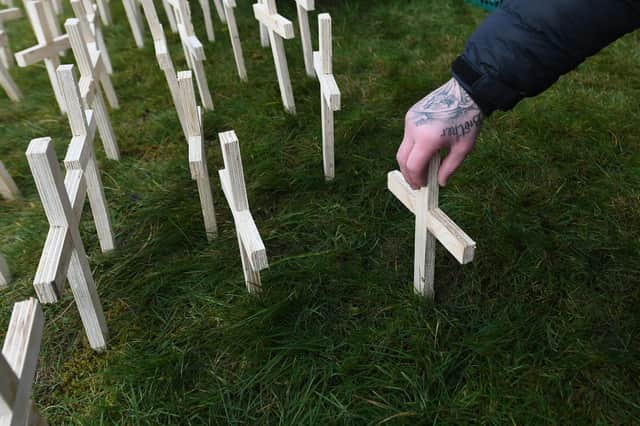Scotland's drug deaths crisis: Rehab funding cuts must stop and we must break the cycle of poverty and drug abuse – Danielle Rowley


I asked how old they were when they first used drugs. The average answer was around 14: one was just eight years old when he was first given drugs.
That answer will shock many people, yet for others, it will sadly be no surprise at all. Either way it is vital to bear this in mind when looking at how we tackle Scotland’s drugs crisis.
Advertisement
Hide AdAdvertisement
Hide AdThe statistics released this week confirmed that Scotland continues to have the highest drug death rate in all of Europe, and that 2019 saw a six per cent rise in deaths since 2018, the figure now standing at more than double what it was in 2014. Since these figures were released on Tuesday, around 15 people will have died a drug-related death.
Political leadership
Anything causing such large amounts of death and devastation (for example, a virus) ought to cause widespread shock, anger, and a demand for action. But looking on social media, reading the headlines, speaking to neighbours this week, it appeared to be only the usual suspects, and by this, I mean dedicated campaigners, journalists and politicians who have been pushing for change for a long time, who were up in arms about these shocking new statistics. Why?
Sadly, when the public don’t prioritise an issue, it often means politicians won’t either. Though this is in itself a result of the lack of visible outrage in the media, it also then becomes a major factor in the continued lack of coverage: if we can break this cycle and change public attitudes then those holding the power will have to listen. Although there has been great cross-party support for action on drug deaths, we need greater political leadership on the issue, and immediate action from the top.
Last year, as part of the committee’s inquiry, I visited harm reduction projects in Canada, Germany and Portugal.
One of the projects we visited in Ottawa was a safe consumption site. It was located inside of a medical centre with access to addiction specialists, councillors and wider support for people attending. The committee asked, with the facility being in a residential area, if there was much public opposition. The manager looked puzzled and asked us why local people would prefer drug users injecting and dying on their streets to them using drugs in a safe, monitored and enclosed environment where they could access help. It’s a good question, right?
Beware issue becoming politicised
I understand our natural reaction can be to make people feel guilty that people are dying on our streets, to say that each death is "someone’s son”. However, everyone is someone’s son, and it seems that this message often doesn’t resonate. How many times do we hear a remark or read in the comments “it’s their own fault” or “they should choose not to”?
When I hear this common retort, I think back to the panel of people I listened to. Men and women, some my own age, who had already been through a huge amount of trauma and a recovery journey. Men and women who, as children, were introduced to drugs. Where is the personal choice or responsibility, for someone as young as 14 or eight?
Rather than guilting the public into action, let’s spread a positive message of how we can use approaches that have successfully transformed communities in other countries. Show people how the current safe consumption van in Glasgow is helping to keep drug use out of the city’s alley ways, and has already saved lives – the van was initially met with uncertainty and suspicion, but as media coverage has grown and locals have seen it in action, support has grown. Let’s talk about what options our politicians have to tackle drug gangs that have a grip on many of our communities.
Advertisement
Hide AdAdvertisement
Hide AdAlthough it was positive to this week see Nicola Sturgeon speak about the drugs crisis, seemingly agreeing that more must be done, we must keep political pressure up and ensure the actions of Government result in more than another talking shop.
I worry however, that this issue risks becoming so politicised that any political debate boils down to finger-pointing. It would be a huge insult to the people who have died and to their families if this becomes another ‘Westminster vs Holyrood’ debate. Having spent a couple of years in Westminster, I saw this happen all too often over serious issues. Passing the blame up and down the country like an unwanted Christmas gift that no one ever opens.
Choose not to look the other way
The drugs emergency must be a priority in all levels of government, and treated at all levels as a public health issue rather than criminal justice.
Our political leaders should work with charities, organisations and people with experience of drug use to understand addiction and its causes properly. Bold action must then follow to support people with complicated addiction issues and complex needs.
Whenever I hear the so-called “Trainspotting generation” mentioned in relation to Scotland’s drugs crisis, I think about the panel of people I met. Some older, some younger, a few who had lost parents and family to drugs, and most who had been around drugs since a young age. This is not Trainspotting, and this is not a generational issue.
Choose life, yes. But it’s us who has the choice. We can choose not to look the other way. Politicians can choose to work together on solutions to support future generations of children, breaking the cycle of poverty and drug use.
They can choose to bring about evidence-based change now to support current drug users into recovery, and stop the funding cuts for rehab services. And we can choose to honour those who it’s too late to help, by ensuring we learn from their deaths.
Danielle Rowley is former Labour MP for Midlothian
